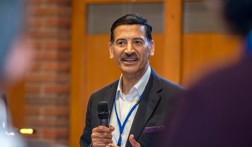Engineering has driven economic growth, prosperity and health benefits to society. This will continue to be the case even as humanity and the planet face the greatest challenges of the 21st century. Engineering will play a key role and be the driving force for the solutions to address these challenges. Yet interest in engineering amongst young people and the wider public seems to have stagnated, with minimal increase in the share of students choosing to study engineering and related subjects from post-16 education onwards. A radical and transformative programme is needed to address not only the engineer shortage but also the emerging skills gaps in digital and environmental sustainability, coinciding with the establishment of the new government Department for Science, Innovation and Technology and the need to champion further focus in this area.
The government 2021 Green Jobs Taskforce report estimates around 500,000 new jobs are needed to meet net zero challenges by 2050 in sectors such as renewable energy, nuclear and electrification of transportations. This significant increase in demand exacerbates long-term historic shortfalls in engineering skills supply. EngineeringUK, the body which undertakes this analysis for the profession, estimated pre-pandemic shortfalls of between 39,000 – 57,000 engineers and technicians with level three skills and above, each year to 2024. The UK’s engineering skills shortage is not a new problem. Despite the efforts of many stakeholders, progress over the last two decades has been slow and the time has come for bold and radical action. Addressing a challenge of this scale requires a collaborative approach. It cannot be achieved solely by academics, industry or professional bodies working on their own. It is time for real change.
We now need a bold ten-year national level programme that focuses on building the skills, talent and leadership in the UK for 21st century Engineering education and expertise. The programme will produce a connected and long pipeline from schools and FE colleges to universities and industry, including upskilling and reskilling in the current workforce, in a coordinated way - working with employers, professional institutions, skills bodies, charities and the Royal Academy of Engineering.
This ten-year programme will develop the vision, delivery plan, monitoring, coordination and allocation of resources to redesign engineering education and training in universities and FE colleges, focusing on sustainable and digital engineering. The focus will be on advanced and higher technical skills and graduate and postgraduate skills for industry.
Such a programme should secure government investment of a similar level to that of the AI sector component for skills (£500m) to be used to develop sustainable and digital undergraduate and master's engineering curricula that have been accredited by the professional bodies.
Key components of the programme should include:
- An invitation for higher education institutions delivering engineering degrees to bid for 5,000 UG degree and MSc studentships in an open and competitive call through Research England and/or the Department for Education. The call will set targets to attract students from non-traditional entry routes and from low socio-economic backgrounds.
- It will be critical for laboratories and facilities to be aligned to the new engineering curriculum. There should be a capital investment fund that FE colleges and universities can bid for, developing such facilities to support sustainable and digital engineering teaching.
- New models of teaching and learning should be promoted. Universities and FE colleges will bid for degree apprenticeships for one thousand studentships in an open and competitive call.
- Industry must play its part. Engineering businesses should offer paid internships for students on the above programmes.
- Up to three hundred secondary schools in the UK will become centres of excellence of engineering teaching and will partner with local colleges, universities, local and regional industries involved in the above. We will benefit from charitable foundations such as STEM Learning and its ENTHUSE partnerships between schools and local engineering and tech businesses to achieve this objective, as well as the UK Electronics Skills Foundation (UKESF), which encourages more young people into Electronics and Engineering through a number of innovative initiatives.
- The programme will support up to five hundred visiting professorships and industrial fellowships over the programme period, such as the current RAEng programmes to enable staff mobility between universities, FE colleges and industry.
- The programme will work with the DoE to introduce engineering teaching to the primary school curriculum, as calledon the government recently by the IET with over 150 engineers. See here
- The programme will be governed through a Council similar to the AI Council, bringing together government, academia, professional bodies, business and industry. The Engineering Education and Skills Programme will work closely with the AI Council and other government high-tech initiatives such as the UK Innovation Strategy to maximise benefits.
Engineering research and impact are vibrant in the UK as evidenced by REF2021 and this gives a perfect opportunity to take a holistic approach to designing research-led engineering education fit for the 21st century. The AI sector deal introduced in 2019 has transformed UK capability and capacity in the high-tech space. We have the expertise and confidence to deliver a transformative National Engineering Programme such as this proposed above.
This approach aligns consistently with the recently published UK Science and Technology Framework, which sets out clear goals for the UK to become the most innovative economy in the world, thereby highlighting the importance of STEM skills. As engineers, we have a strong obligation to establish the UK as a global leader in engineering design and innovation in the era of digital transformation and sustainability. Now is the time to present our case and make the change.

Professor Bashir M. Al-Hashimi is UK Electronics Skills Foundation (UKESF) Trustee & Director and Vice-President (Research & Innovation) at Kings College










Water Sector Talent Exodus Could Cripple The Sector
Maybe if things are essential for the running of a country and we want to pay a fair price we should be running these utilities on a not for profit...